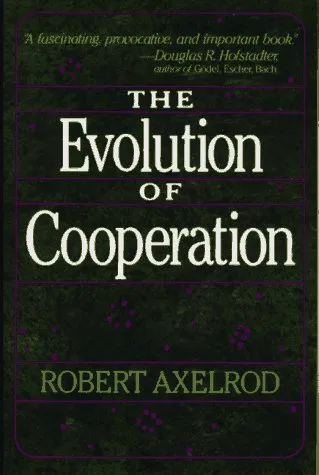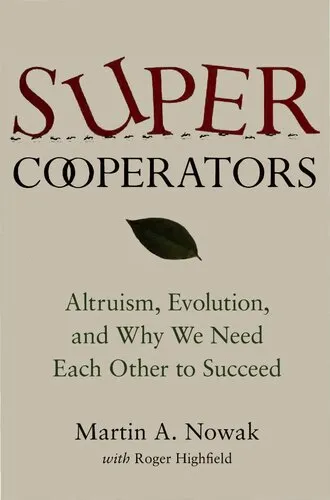The Origins of Virtue: Human Instincts and the Evolution of Cooperation
4.4
Reviews from our users

You Can Ask your questions from this book's AI after Login
Each download or ask from book AI costs 2 points. To earn more free points, please visit the Points Guide Page and complete some valuable actions.Related Refrences:
Welcome to the introduction to The Origins of Virtue: Human Instincts and the Evolution of Cooperation, a thought-provoking book by Matt Ridley that delves deep into humanity's inherent ability to collaborate, share, and uphold social bonds. This book introduces readers to the evolutionary roots of cooperation and virtue, exploring how these qualities have shaped human societies over centuries. It bridges the gap between biology and social science, offering a compelling narrative on why humans are uniquely capable of balancing selfish impulses with altruistic tendencies.
About the Book
The Origins of Virtue challenges common assumptions about human behavior, especially the dichotomy between selfishness and selflessness. Ridley takes us on a journey through history, anthropology, economics, and evolutionary biology to explain why humans cooperate in ways that seem counterintuitive in a world driven by competition and survival of the fittest. Through captivating stories, examples from the animal kingdom, and insights into human culture, Ridley demonstrates that our social instincts—far from being anomalies—are products of evolution.
Ridley's primary argument is that humans evolved to collaborate because it provides an evolutionary advantage. Cooperation, trust, and moral behavior are not artificial constructs imposed by society but are instead encoded in our genetic blueprint. By examining everything from gift-giving among hunter-gatherers to the intricacies of free-market systems, Ridley uncovers the deep evolutionary roots that underpin these behaviors.
Detailed Summary of the Book
The book is divided into thematic sections that explore different aspects of cooperation and virtue, drawing from fields like biology, game theory, and anthropology. Ridley begins by arguing that modern humans are unique in their ability to work together in groups beyond immediate family members, a trait rare in most of the animal kingdom. Drawing comparisons to ants, bees, and other social animals, he highlights how humans harness cooperation to achieve unparalleled complexity in societies.
Ridley applies principles like the "selfish gene" theory to cooperation, illustrating that seemingly altruistic behaviors often serve subtle self-interest. Using game theory, particularly the "Prisoner's Dilemma," Ridley explains how reciprocity and trust emerge even in competitive scenarios. He examines how cultural norms, reputation, and even punishment incentivize cooperative behavior, making it a beneficial strategy over time.
The latter part of the book explores the implications of our cooperative nature in modern society, tackling questions about economics, inequality, and governance. Ridley convincingly argues that systems that harness natural human instincts for trust and reciprocity perform better than those relying on top-down control. The book ultimately makes the case for decentralized systems, voluntary cooperation, and mutual aid as solutions grounded in our evolutionary heritage.
Key Takeaways
- Humans are biologically hardwired for cooperation; our social behaviors are rooted in evolutionary processes.
- Seemingly altruistic acts often serve a subtle self-interest, aligning cooperation with rational self-gain.
- Trust and reciprocity, key components of cooperation, emerge naturally in human societies without centralized control.
- Economic and societal systems that leverage human instincts for collaboration tend to be more effective and sustainable.
- Understanding the evolutionary origins of virtue is essential to addressing current global challenges and fostering harmonious societies.
Famous Quotes from the Book
"The world is not full of unselfish people trying to maximize the welfare of their group. But neither is it full of selfish people trying ruthlessly to maximize their own benefit. It is full of really quite intelligent people trying to pursue what is good for them and their families, trying to make compromises."
"Exchange, both economic and cultural, is the principal feature of human societies. In this sense, society is a creation of cooperation, not competition."
Why This Book Matters
In a world often polarized by discussions of selfishness versus altruism, The Origins of Virtue provides a balanced, evolutionary perspective that reframes how we think about morality and cooperation. Ridley's arguments emphasize that human beings are not inherently selfish or virtuous but instead operate within an adaptive framework that encourages collaboration for mutual benefit.
The book is particularly relevant in today’s climate of global challenges—from economic inequality to environmental crises—that demand collective solutions. By understanding the biological and evolutionary basis of cooperation, readers can gain insights into how to foster trust, reciprocity, and collective action in their own communities and beyond.
Furthermore, the book serves as a bridge between science and philosophy, showing how timeless questions about morality and human nature can be explored through the lens of modern biology. It is an essential read for anyone interested in the origins of human behavior, the mechanics of social systems, and the shared values that bind us together as a species.
Free Direct Download
You Can Download this book after Login
Accessing books through legal platforms and public libraries not only supports the rights of authors and publishers but also contributes to the sustainability of reading culture. Before downloading, please take a moment to consider these options.
Find this book on other platforms:
WorldCat helps you find books in libraries worldwide.
See ratings, reviews, and discussions on Goodreads.
Find and buy rare or used books on AbeBooks.
1313
بازدید4.4
امتیاز50
نظر98%
رضایتReviews:
4.4
Based on 0 users review
"کیفیت چاپ عالی بود، خیلی راضیام"
Questions & Answers
Ask questions about this book or help others by answering
No questions yet. Be the first to ask!







